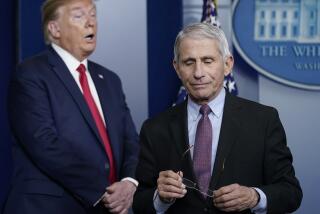Warming Winds for Icy Debate
- Share via
Ever since 1633, when the Roman Catholic Church found Galileo guilty of heresy for insisting that the Earth revolves around the sun, a chill has stood between science and religion. But recent years have brought heartening signs of warming. In 1992, the Vatican formally apologized for arresting Galileo, and last fall Pope John Paul II gingerly acknowledged evolution to be “more than just a hypothesis.” Later this year, Pasadena’s Fuller Theological Seminary, a Protestant conservative hub, will publish a book affirming evolutionary theories.
There has also been some closure from the ranks of science. True, many scientists still think that to be taken seriously they must scoff at religious faith. But recently, bellwether institutions like the National Academy of Sciences have launched projects to promote dialogue between science and religion.
The church/science gulf works against scientists’ own self-interest, Gregg Easterbrook argues in Science magazine. He quotes UC Irvine geneticist Francisco Ayala: “The financial structure of American research depends on the good will of a body politic that values religion.”
It is not only in scientists’ self-interest to respect religion. It is in science’s best interest. Today, society calls on scientific authorities to answer questions once posed only to religious authorities. Courts ask psychiatrists to determine when someone is “personally responsible” for committing a crime. Biologists are asked to pinpoint the beginning and end of life. Cosmologists are asked how matter came to be. In truth, there are no scientifically proven answers to some of these questions, and some scientists may end up presenting as objective science what is really personal conviction. This can be the death of science for, as Isaac Newton and Albert Einstein pointed out, scientific discoveries tend to be made not by those who seek to prove a hypothesis but rather by those who keep their eyes open for revelation.
At their best, religion and science share a reverence for the mystery and beauty of the unknown. As Francis Collins, a devout Christian and director of the Human Genome Project at the National Institutes of Health, puts it: “When something new is revealed about the human genome, I experience a feeling of awe at the realization humanity now knows something only God knew before. It is a deeply moving sensation that helps me appreciate the spiritual side of life and also makes the practice of science more rewarding.”






